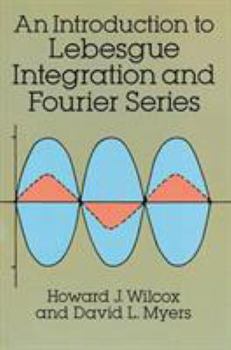Introduction to Lebesgue Integration and Fourier Series
Select Format
Select Condition 
Book Overview
This clear and concise introductory treatment for undergraduates covers the Riemann integral, measurable sets and their properties, measurable functions, the Lebesgue integral and convergence, pointwise conversion of the Fourier series, and other subjects. Numerous examples and exercises supplement the text. Basic knowledge of advanced calculus is the sole prerequisite. 1978 edition.
Format:Paperback
Language:English
ISBN:0486682935
ISBN13:9780486682938
Release Date:January 1995
Publisher:Dover Publications
Length:192 Pages
Weight:0.65 lbs.
Dimensions:0.4" x 6.2" x 9.2"
Related Subjects
Calculus Math Mathematical Analysis Mathematics Pure Mathematics Science & Math TrigonometryCustomer Reviews
5 ratings
Some very good math here
Published by Thriftbooks.com User , 15 years ago
The Fourier series sections leaves something to be desired ( like good integral and graphs or real examples of Fourier series), but the integration theory , measure and set theory parts are very good as far as they go. The use of a back slash notation for the complement of a set is new to me and as far as I can tell never really defined in the text. As this book is a cheap Dover text you might want to get one that gives real examples of Fourier series as well: at least the ones for square and triangular waves used in electrical engineering.
so-so
Published by Thriftbooks.com User , 19 years ago
This book was my first contact with measure theory. I read this for self study -- more or less as a leisure book. The material is aimed at undergrads, and probably doesn't assume much past plain ol' college calculus. However, the more you know, the easier it will be to read. Any experience with analysis, and proofs will be helpful. And, in chapter 7, "Function Spaces", a linear algebra course will come in very handy. Anyway, it's not a hard book to read, but it is very dry. Because the book is so short, there is not much room for anything other than a list of definitions, lemmas and theorems. There isn't really much insight. All the way through chapter 7 I was basically plodding along, simply because I wanted to finish the book. However, I'm glad that I did, because I found chapter 8 really fascinating. I think this chapter (Fourier Series in L^2) really ties the book together because you get to see measure theory and lebesgue integration working in harmony with linear algebra. I never really liked linear algebra that much until I read this chapter. Unfortunately, chapter 9 was a let down and I actually quit reading a few pages before the end of the book. I had already got what I needed out of it. It's a good intro to measure theory if you just want to see what it is, and not really go into detail with it. A lot of the lemmas, propositions and corollaries are left as exercises. I tried to do a handful of problems from every chapter, especially the ones that fill in the text, and had little or no difficulty with any of them. I would have given this 3 stars if not for chapter 8. For the price, I would recommend it, especially if you love calculus, but never liked linear algebra, because it will hopefully tie them together for you. Now I can't get enough linear algebra! I know, it's sick ;) Then, with your newfound love of linear algebra, read Hubbard and Hubbard's _Vector_Calculus,_Linear_Algebra,_and_Differential_Forms:_A Unified_Approach_, which is currently blowing my mind :)
Good review of Lebesque integration
Published by Thriftbooks.com User , 19 years ago
This is more about Lebesgue integration, covered in the first 112 of 154 pages, than about Fourier Series. But do not be fooled by the low price; this book makes for very good review of the Lebesgue theory, well organized and concise. Or with moderate mathematical maturity, the reader could learn the theory here.
Gentle Intro to Measure Theory
Published by Thriftbooks.com User , 22 years ago
I am using this book with two advanced undergraduates, after working through a basic introduction to analysis text the previous semester. Each section is about 3 or 4 pages long, giving the main results and most proofs, although some are left as exercises. Each chapter ends with a nice set of exercises, most of which are accessible to students who feel comfortable with epsilon/delta proofs. The book is very short and concise, 145 pages plus an appendix summarizing basic analysis results on sets, countability, functions, and sequences. Chapter 1 reviews the Riemann integral and some of its drawbacks. Chapter 2 introduces the idea of outer measure and measurable sets, all on the unit interval. The next two chapters discuss properties of measurable sets and measurable functions. Chapters 5 and 6 then cover the Lebesgue integral and convergence theorems. The last three chapers introduce L2 spaces, Fourier series, and proofs of convergence.All in all this is a good, very cheap way to learn the basics of measure theory and the Lebesgue integral, before moving on to something like Rudin or Royden.
direct intuitive treatment but much "left as an exercise"
Published by Thriftbooks.com User , 23 years ago
This assumes some advanced calculus and then introduces enough Lebesgue integration amd measure theory to explain and prove the basic convergence results for (generalized) Fourier analysis. Second half of second year and above.Everything is very well motivated and the book is not long, but quite a lot is "left as an exercise for the reader." This really hurts the book for self study in my view. If you have a bigger book on real analysis and want another treatment, or need a refresher this will do nicely. On its own -- you've been warned.





